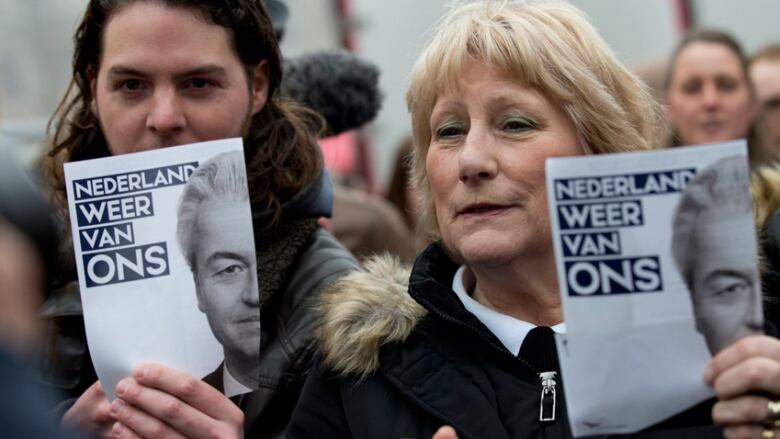Dutch election a test case for Europe's appetite for populist disruptors
Anti-immigration candidate Geert Wilders seen as 'setting the agenda'

"We are the dress rehearsal," said the young security guard with a nervous laugh standing in one of the grand halls of Amsterdam's Rijksmuseum, home to some of the great treasures of the Dutch Golden Age.
Although he admitted that in terms of their size, "France and Germany could swallow the Netherlands up," those countries are closely watching the Dutch vote, as it may set the tone for this election season in Europe.
"We have to go first," the guard said.
On Wednesday, the Dutch will cast their ballots in a national election widely seen as a test case for the rise of far-right populism in Europe, with national elections to follow in France and Germany later this year.
In the Netherlands, that populist house is represented by a nationalist, anti-Islam politician named Geert Wilders, dubbed the Dutch Donald Trump, not least because of his great shock of dyed, platinum-blond hair and a clear preference for communication by tweet.
"He is avoiding all the [mainstream] media. He's throwing the ball directly to his audience, to his constituents," says Wim Kortenoeven, a former MP in Wilders' Party for Freedom, or PVV.
"I would say Donald Trump is like the American version of Geert Wilders. I mean, Wilders has been doing this for 10 years or more."
Making the Netherlands great again?
Wilders has compared the Quran to Mein Kampf and said he wants to close all mosques.

Last year, he was convicted of inciting prejudice in the Netherlands by promising a crowd his party would make sure there were "fewer" Moroccans in the Netherlands.
Kortenoeven left the PVV in 2012 — unhappy, he says, with Wilders authoritarian style of leadership.
"I left his party, but that doesn't mean that I disagree with him. I disagree with the way he wants to solve things without offering real solutions."
Wilders has published a single-page election manifesto with pledges to make the Netherlands "ours" again and to lead the country out of the European Union.
His campaign has been given a boost by the recent contretemps between Turkey and the Netherlands.
In recent days, the Dutch government prevented Turkish ministers from entering the country to address rallies of Turkish expatriates in a bid to win support for an upcoming referendum in Turkey that would dramatically increase the powers of President Recep Tayyip Erdogan.
- Turkey vs. the Netherlands: Why are they fighting?
- Turkey suspends high-level diplomatic relations with Netherlands
Dutch riot police used dogs and water cannons to disperse Turkish protesters in Rotterdam over the weekend.
Wilders' supporters say it's proof Turkish immigrants don't want to integrate.
'Setting the agenda'
The diplomatic spat between the two NATO partners has also given a boost to conservative Prime Minister Mark Rutte, who has increasingly adopted tougher language on immigrants.

The Dutch political spectrum is fragmented, with 28 parties standing in this election. Wilders and Rutte have been neck and neck in the polls.
Even if Wilders were to win more seats, he would have a hard time finding the coalition partners needed to govern. Mainstream parties have said they will refuse to work with him.
Wilders has been cooperating with other far-right parties in the European Union including Marine Le Pen's National Front in France.
But he differs from other right-wing populist leaders in that he supports tolerance when it comes to issues including gay rights and legalized prostitution, two pillars of Dutch liberalism.
But that doesn't make him any more palatable for Dutch people who say they abhor his xenophobic tendencies.
"What bothers me the most is that Wilders has been the one setting the agenda in the election," a Dutch friend said over dinner recently.
"And they [other political parties] have just let him get away with it."
The Dutch Trudeau
One of the few politicians – perhaps the only one – making gains in the other direction is the young leader of the Green Left party.

Jesse Klaver is the son of a Moroccan father and a part-Indonesian mother. His dark curls have led to some comparisons with Canada's Justin Trudeau.
Klaver is campaigning on an unabashed pro-immigration, pro-European platform, saying it's up to the Netherlands to show that the "populist wave" can be stopped.
His supporters say his values are much closer to those of the Dutch Golden Age (in the 1600s), when religious freedom and the protection of minorities were emerging ideas.
Prime Minister Mark Rutte has also said this election must stop the "domino effect" of what he called the wrong kind of populism.
But critics say that in his determination to hold on to power, Rutte has been employing more aggressive language — much closer to that of Wilders — when it comes to immigration.
And that means regardless of the outcome of the election, Geert Wilders has been hugely influential in the lead-up to the vote.

